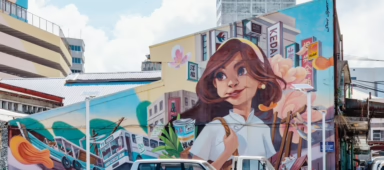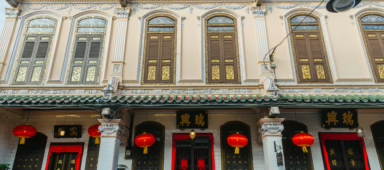The cultural heart of Java enchants with its ancient traditions and modern creativity, making you want to come back for more
Yogyakarta, or Jogja as the locals affectionately call it, is where ancient traditions and modern creativity intertwine. Sprawled between the Indian Ocean and the towering Mount Merapi, this vibrant city in Central Java is often hailed as the cultural heart of Indonesia’s most populous island – a place rich in history, art and irresistible cuisine.
For Norhizam Kadir, a 50-year-old IT professional with a deep appreciation for the arts, Jogja was love at first sight. “My first visit was magical,” he recalls. “I didn’t know what to expect, but the city’s charm and spirituality blew me away.” If you’re planning a weekend escape to Jogja, we’ve copped Norhizam’s three-day itinerary that combines the city’s hidden gems and timeless wonders.

Day 1: A spiritual and cultural introduction
Morning. Kick off your trip with a visit to Prambanan Temple, a Unesco World Heritage Site and one of the largest Hindu temples in Southeast Asia. Built in the 9th century during the Mataram Kingdom, this stunning complex features towering spires and intricate carvings that depict stories from the Ramayana epic. Dedicated to the Trimurti – the three principal Hindu gods: Brahma, Vishnu and Shiva – the temple fell into ruin over time but was restored in the 20th century. Today it’s a symbol of Indonesia’s rich cultural heritage. The temple opens at 6am, making it a great spot to catch a breathtaking sunrise.

But the real magic unfolds in the evening, when the Ramayana ballet takes centre stage. Performed in an open-air theatre with the temple as a dramatic backdrop, this traditional dance drama brings the epic tale of Prince Rama to life. The performance combines classical Javanese dance with modern storytelling elements, captivating locals and tourists alike. “Watching the ballet at Prambanan is unforgettable,” says Norhizam. “It’s a beautiful mix of culture and history.”

Afternoon. Head north to Sleman, a region known for its lush landscapes and traditional crafts. Here, a small tempeh factory also teaches visitors how this fermented soybean cake, an Indonesian staple, is made. “It’s a simple but very fascinating process,” says Norhizam, and “it plays a big role in Javanese food.” From Sleman, drive 40 minutes to Mie Ayam Ibu Tumini, a humble eatery known for its tasty chicken noodles. This is a great spot to refuel before continuing your adventure.

Evening. As the sun sets, explore Malioboro Street, Jogja’s bustling hub of street food, shopping and culture. This lively area is perfect for picking up souvenirs such as batik, a traditional Indonesian fabric. “I couldn’t resist buying lots of it at Beringharjo Market, a historic market that’s been around for centuries,” says Norhizam. End your day with a traditional Javanese dinner at Sekar Kedhaton, a restaurant that offers a refined take on local dishes. Try their gudeg, a sweet and savoury jackfruit stew, or opor ayam, a creamy chicken curry.
Day 2: Nature, art and culinary delights
Morning. Start your day with a visit to a pasar pagi (morning market) to experience Jogja’s vibrant daily life. These bustling markets are a feast for the senses, filled with vendors selling fresh produce, aromatic spices and traditional snacks. Opening as early as 4am, they offer a glimpse into the city’s morning rhythm before the streets fully awaken.

Afterwards, swap the urban energy for the tranquil ambience of Pinus Pengger Pine Forest, about an hour’s drive from Jogja. This peaceful spot is perfect for a morning walk among the towering pine trees, offering a refreshing change of pace. “I particularly enjoyed the owl conservation centre,” says Norhizam. “It was such a unique experience. Being surrounded by nature and learning about these birds – and the importance of conserving them – was truly refreshing.”

Afternoon. Back in Jogja, immerse yourself in its vibrant art scene with a visit to the Affandi Museum, once home to Indonesia’s most famous painter. Born Affandi Koesoema, his expressive works are a must-see for art lovers. As an avid art collector, Norhizam also recommends exploring local galleries and art villages, such as Kasongan, renowned for its ceramics. “Jogja is full of creativity,” he says. “I love collecting pieces from young artists. I have some beautiful ceramics from Kasongan, and each piece tells a story of Jogja’s artistic heritage. The village is a hub for pottery, and watching the artisans shape clay into intricate designs is mesmerising. Plus, it’s only 30 minutes from the museum.”
For lunch, stop by Kedai Rukun, a cosy eatery serving authentic Javanese flavours. Norhizam highly recommends their soto, a fragrant soup, and fermented fish. “The food here is simple but delicious,” he says. “It’s a great introduction to Jogja’s flavours. The soto is particularly special – light and refreshing, with a clear broth that differs from the richer, coconut milk-based versions found elsewhere. It’s infused with spices such as turmeric and lemongrass, allowing the delicate flavours of the tender chicken and fresh herbs to shine through. It’s comforting yet light, perfect for Jogja’s warm weather.”
Evening. For dinner, treat yourself to an unforgettable experience at Amanjiwo, a luxurious resort with stunning views of Borobudur Temple. The elegant setting and exquisite cuisine provide the perfect finale to your day.

Day 3: A journey through history and tradition
Morning. No trip to Jogja is complete without a visit to Borobudur Temple, the world’s largest Buddhist monument. Built in the 9th century during the Sailendra Dynasty, this architectural marvel is adorned with intricate carvings and over 500 Buddha statues. Its design reflects Buddhist cosmology, with three levels symbolising the realms of desire, form and formlessness. Arrive early to witness the sunrise over the temple – an unforgettable, almost mystical experience.

After soaking in the beauty of Borobudur, head to Plataran for their famous becak breakfast. This unique meal is delivered straight to your table on a traditional tricycle, popularly known as becaks. “I highly recommend the becak breakfast, it’s an absolute delight,” Norhizam says. “Imagine sitting down for a meal, and suddenly, a colourful becak rolls up, carrying a spread of delicious dishes. It’s playful, unexpected and such a fun way to start the day.”

Afternoon. After breakfast, visit Kraton Yogyakarta, the Sultan’s Palace. This living museum offers a glimpse into Javanese royalty and traditions. Just a short distance away, explore Taman Sari Water Castle, a former royal garden with serene pools and hidden tunnels.

For lunch, indulge in gudeg at Gudeg Yu Djum, a local favourite known for its rich, slow-cooked jackfruit stew. Norhizam also recommends garang asem, a tangy and refreshing dish made with chicken and tamarind.
Evening. End your weekend with a stroll through Alun-Alun Kidul, the city’s southern square. Take part in the local tradition of walking blindfolded between two banyan trees – legend has it that those who succeed will be blessed with good luck. For your final meal, head to Warung Brongkos Handayani, a beloved institution serving traditional Javanese food since 1975. Their signature dish, nasi brongkos, is a rich and savoury combination of rice, kacang tolo (black-eyed peas) and kluwek (a traditional spice). It’s typically served with sides like tahu telur (tofu and egg) and koyor (slow-cooked cow skin). Pair your meal with wedang uwuh, a traditional herbal drink to round up the experience.
Jogja is a place that stays with you long after you leave. As Norhizam puts it, “There are so many magical corners to explore. Every visit feels like a new adventure.” Whether you come for its temples, art or cuisine, Jogja will leave you enchanted.

Where to stay in Yogyakarta
Amanjiwo . A serene sanctuary with breathtaking views of Borobudur, this ultra-luxurious retreat offers elegant suites with private pools and impeccable service, all wrapped in Javanese palace-inspired architecture.
Plataran Borobudur Resort & Spa . Blending Javanese tradition with modern comforts, this refined resort features private pool villas, exquisite dining and a world-class spa, all set against the backdrop of ancient Borobudur.
The Phoenix Hotel Yogyakarta – Handwritten Collection . A colonial-era gem in the heart of Jogja, this heritage hotel charms with its ornate architecture, antique furnishings and a tranquil courtyard pool, offering a stylish retreat near Malioboro.





